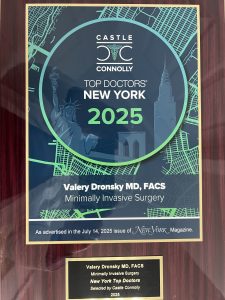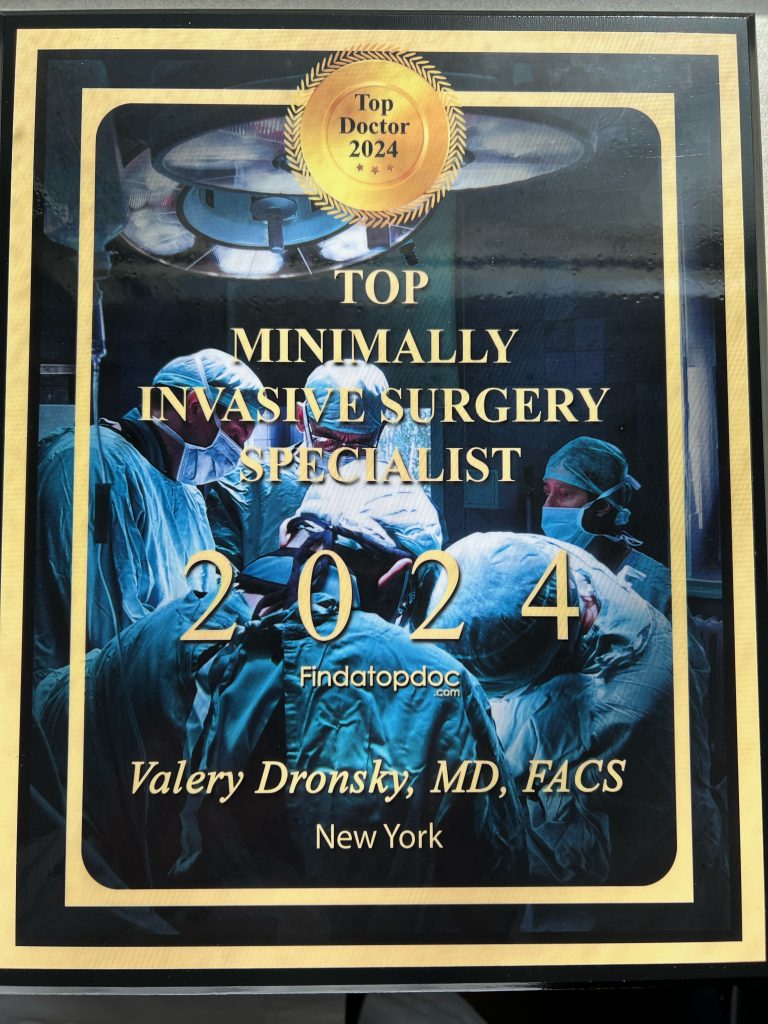CALL TODAY 646-846-1136 | EMAIL
Surgical Experts Dedicated to Improving Lives
At Lenox Hill Minimally Invasive Surgery PLLC, Dr. Valery Dronsky and his staff of medical professionals provide compassionate care with the highest ethical & professional standards. In our state of the art facility, we offer surgical services using only the most cutting edge and current procedures and treatments. We specialize in general surgery, including extensive experience in performing hernia repair surgery. Our expertise is in minimally invasive surgery and robotic surgery. Minimally invasive and robotic surgery often allow patients to experience easier recovery than traditional open surgery. They also allow for more precise and less traumatic surgery. When robotic and minimally invasive surgery is not an option, we are also skilled and experienced in traditional open surgical procedures.
Dr. Dronsky is an experienced and highly skilled surgeon having undergone extensive training in school, residency and fellowships. He practices medicine with ethical behavior, compassion and superb bedside manner. In the operating room he exhibits precision mechanical abilities, analytical thinking and the ability to visualize tissue in three dimensions. These innate and learned skills allow Dr. Dronsky to be one of the most dexterous and skilled professionals in New York City and the Country.
Call us: 646-846-1136
PATIENT TESTIMONIALS
Recent Awards
We are honored and deeply appreciative to have consistently received prestigious awards and recognition year after year, establishing us as one of New York’s foremost hospitals for a wide range of general surgeries, safety measures, specialized procedures, and overall excellence in healthcare. At Lenox Hill Minimally Invasive Surgery, our unwavering commitment lies in delivering exceptional care and unwavering support to our patients, guaranteeing their safety and successful recovery throughout their entire surgical experience.
Hospital Quality Awards
 America’s 50 Best Hospitals Award™ (2023, 2022)
America’s 50 Best Hospitals Award™ (2023, 2022)
Top 1% in the nation for providing the highest clinical quality year over year.

America’s 100 Best Hospitals Award™ (2021)
Top 2% in the nation for consistently delivering clinical quality year over year.

America’s 250 Best Hospitals Award™ (2023, 2022, 2021)
Top 5% in the nation for consistently delivering clinical quality.

Patient Safety Excellence Award™ (2023, 2022)
Top in the nation for providing excellence in patient safety by preventing infections, medical errors, and other preventable complications.
Specialty Clinical Quality Awards

America’s 100 Best Hospitals for Cardiac Care Award™ (2023, 2022, 2021, 2020, 2019)
Superior clinical outcomes in heart bypass surgery, coronary interventional procedures, heart attack treatment, heart failure treatment, and heart valve surgery.

America’s 100 Best Hospitals for Coronary Intervention Award™ (2023, 2022, 2021, 2020, 2019)
Superior clinical outcomes in coronary intervention procedures (angioplasty with stent).

America’s 100 Best Hospitals for Prostate Surgery Award™ (2023, 2022, 2021)
Superior clinical outcomes in prostate removal surgery and transurethral resection of the prostate.
Click to see all of our Healthgrades best doctors awards





Visit our main website at www.LenoxHillMinimallyInvasiveSurgery.com
Blog Posts are Below:
Category Archives: Spleen Surgery
Spleen Surgery: Surgical Interventions for Splenic Conditions
In this guide, we’ll explore common splenic conditions that may require surgery, the types of surgical interventions available, and what patients can expect during recovery.
The spleen is an important organ located in the upper left side of the abdomen. It plays a crucial role in filtering blood, fighting infections, and managing blood cells. Although the spleen is essential for immune function, certain conditions and injuries may require surgical intervention to remove or repair the spleen. Spleen surgery, or splenectomy, can significantly improve a patient’s quality of life, especially when the organ’s dysfunction or damage leads to other health complications.
Common Conditions Requiring Spleen Surgery
There are several conditions and situations where spleen surgery may be necessary. Here are some of the most common reasons for surgical intervention:
1. Splenic Rupture
A ruptured spleen is often the result of trauma, such as a car accident or a severe fall. A ruptured spleen can cause internal bleeding and is a medical emergency. Surgery may be required to remove or repair the spleen, depending on the extent of the injury.
2. Splenomegaly (Enlarged Spleen)
Splenomegaly is a condition where the spleen becomes enlarged, often due to infections, liver disease, blood disorders, or certain cancers. An enlarged spleen may cause pain, fatigue, and an increased risk of rupture. If the spleen is severely enlarged and causes symptoms, a splenectomy may be recommended.
3. Hematologic Disorders
Certain blood disorders, such as idiopathic thrombocytopenic purpura (ITP), thalassemia, and hereditary spherocytosis, affect the function of the spleen. In some cases, removing the spleen can help manage these disorders by improving blood cell counts or reducing symptoms.
4. Spleen Cysts and Tumors
Although rare, cysts and tumors can develop in the spleen. These growths may be benign or malignant, and large or symptomatic cysts or tumors may require surgical removal. A partial splenectomy may be performed if only a part of the spleen is affected.
5. Sickle Cell Disease
In patients with sickle cell disease, the spleen may become damaged over time due to the abnormal shape of red blood cells. This can lead to a condition known as autosplenectomy, where the spleen shrinks and loses function. In some cases, surgical removal of the damaged spleen may be necessary to prevent further complications.
Types of Spleen Surgery
The type of surgery performed on the spleen depends on the underlying condition and the extent of damage. Here are the primary types of splenic surgery:
- Splenectomy: A splenectomy is the complete removal of the spleen. It is commonly performed in cases of trauma, certain blood disorders, and when the spleen is severely enlarged or damaged. After a splenectomy, the body can still function without the spleen, but patients may need vaccinations and preventive measures to reduce the risk of infections.
- Partial Splenectomy: In some cases, only part of the spleen is removed, allowing the patient to retain some splenic function. This is often considered for patients with localized cysts, tumors, or partial trauma. A partial splenectomy preserves some immune function and reduces the risk of infection.
- Splenic Artery Embolization: Splenic artery embolization is a less invasive procedure that involves blocking the blood supply to the spleen, causing part of it to shrink. This technique can be used to treat splenic trauma or reduce spleen size in certain hematologic conditions, and may be performed as an alternative to full splenectomy.
- Laparoscopic Splenectomy: Laparoscopic splenectomy is a minimally invasive technique used to remove the spleen through small incisions. Using a laparoscope (a thin tube with a camera) and specialized instruments, the surgeon can perform the splenectomy with minimal trauma to surrounding tissues. Laparoscopic splenectomy is often preferred due to its faster recovery time and reduced post-operative pain.
Benefits of Minimally Invasive Spleen Surgery
When possible, minimally invasive spleen surgery, such as laparoscopic splenectomy, is preferred over traditional open surgery. Minimally invasive surgery offers several benefits:
- Reduced Pain: Smaller incisions mean less trauma to the body, leading to less post-operative pain.
- Faster Recovery: Patients who undergo laparoscopic procedures often experience a quicker recovery and shorter hospital stay.
- Lower Risk of Infection: The risk of infection is reduced due to smaller incisions and less tissue disruption.
- Minimal Scarring: Small incisions result in less visible scarring, which can improve physical and psychological recovery.
Recovery and Post-Operative Care
Recovery from spleen surgery depends on the type of procedure performed and the individual’s overall health. Here’s what patients can generally expect during the recovery period:
- Hospital Stay: After a laparoscopic splenectomy, most patients can go home within a few days. However, open surgery may require a longer hospital stay for observation and pain management.
- Pain Management: Pain is common after spleen surgery, especially with open procedures. Pain management techniques include prescribed medications and following post-operative care instructions.
- Physical Activity: Light physical activity, such as walking, is encouraged after surgery to prevent blood clots and improve circulation. However, strenuous activities and heavy lifting should be avoided for several weeks to prevent complications.
- Risk of Infection: Since the spleen plays an important role in the immune system, patients who undergo a splenectomy have a higher risk of infection. It’s essential for these patients to receive vaccinations and may require preventive antibiotics.
- Dietary Adjustments: There are usually no specific dietary restrictions after spleen surgery, but following a balanced diet can support healing and recovery.
Improving Quality of Life through Spleen Surgery
For many patients with chronic spleen-related conditions, surgery can significantly improve quality of life. Removing or partially removing the spleen can help alleviate symptoms, prevent future health risks, and allow patients to resume their daily activities without discomfort. Patients with hematologic disorders, for example, may experience more stable blood cell counts and reduced symptoms after a splenectomy.
While living without a spleen requires some lifestyle adjustments and preventive health measures, the overall impact on daily life can be positive. Many patients experience long-term relief from symptoms and complications, leading to improved physical and mental well-being.

When to Consider Spleen Surgery
If you have a splenic condition that affects your quality of life or poses a health risk, spleen surgery may be an appropriate option. Consulting with an experienced general surgeon who specializes in splenic conditions can help you understand the benefits, risks, and expected outcomes of surgery. Early intervention can often prevent complications and lead to better outcomes.
For those seeking expert splenic surgery in Manhattan, the team at Lenox Hill Minimally Invasive Surgery provides compassionate, specialized care for a wide range of splenic conditions. Contact us today to schedule a consultation and learn more about the advanced surgical options available to help you achieve optimal health.
Contact Information
LENOX HILL MINIMALLY INVASIVE SURGERY PLLC
117 E 77th Street
New York, NY 10075
646-846-1136
admin@lenoxmis.com
Visit our website for more information: https://lenoxhillminimallyinvasivesurgery.com/
Spleen Problems
Do you have spleen problems? The spleen is a soft, spongy organ that rests under your rib cage in the upper left portion of the abdomen toward the back. The spleen is normally equal to the size of the fist and is an integral part of the lymph system. This small organ defends your body in multiple ways.
- First, the spleen filters your blood and removes the damaged blood cells from the bloodstream.
- Also, it produces white blood cells, thereby preventing the body against germs and bacteria.
- Spleen houses the red blood cells and platelets that help your blood clot.
Spleen Problems: What is Splenomegaly?
Sometimes, the spleen gets larger than its size, which may affect either of the functions it performs. As a result, the enlarged spleen or splenomegaly, starts filtering not only the damaged blood cells but also the healthy cells in your bloodstream. This causes a reduction in the number of normal blood cells in your body.
Also, the excessive red blood cells and platelets may obstruct your spleen and affect the functioning adversely. Sometimes, a physical examination may not be enough to feel the spleen. However, certain diseases may result in a swollen and enlarged spleen. It is important to know that an enlarged spleen does not always indicate a problem. Rather, it might signal an overactive spleen.
Symptoms of Spleen Enlargement
Sometimes, an enlarged spleen causes no signs or clear symptoms. However, some people may experience discomfort or pain in the upper left side of the abdomen radiating to the left shoulder. Your spleen may become so large that it presses on your stomach. As a result, you may feel full without eating or only eating a small amount.
When the enlarged spleen exerts pressure on the other organs, it affects the blood flow to the spleen. Thus, the spleen may not be able to work actively. The removal of too many blood cells due to abnormal spleen functioning may cause anemia. Also, the low count of white blood cells may expose you to infections more often.
Causes of Splenomegaly
The enlargement of the spleen may cause several infections and diseases. Some of the main causes of enlarged spleen include:
- Bacterial infections, such as syphilis
- Parasitic infection, for instance, malaria
- Viral infection like mononucleosis
- Liver diseases
- Hemolytic anemia
- Metabolic disorders
- Blood cancer
- A blood clot in the spleen or liver
Treatment
A ruptured spleen may cause bleeding in the abdominal activity that may prove fatal. It is paramount to get medical help for the enlargement of the spleen. You can’t afford to leave an enlarged spleen untreated as it may lead you to serious medical issues.
Most of the times, treating the root cause of spleen enlargement may help evade the removal of the spleen. For instance, if the spleen enlargement is a result of an infection, the doctor may prescribe antibiotics. Shrinking the spleen through radiation may save you from spleen removal.
Splenectomy
However, if the doctor fails to identify the main culprit, or the case is severe, then the surgeon may remove the spleen through splenectomy. For the procedure, the doctors prefer minimally invasive surgery to open surgery. Hence, for removing the spleen, the surgeon marks several small incisions. With the help of laparoscopy, the doctor then removes the enlarged spleen.
You are required to be extra cautious after the spleen removal surgery as it makes you susceptible to contract infections more often. Hence, you may not be able to fight the bacteria effectively. However, vaccines, certain medicines, and antibiotics may help reduce the risk of infection post-surgery.
Final Word
Your spleen is a small but integral organ of your body, and the enlargement of spleen may have drastic effects on the functioning of it. Therefore, it is vital to your health to seek professional help for your major and minor spleen problems.
Contact Lenox Hill Minimally Invasive Surgery today and schedule an appointment with the best surgeons in NYC for spleen removal.
Spleen Surgery – NYC General Surgeon
Spleen Surgery: Steps, Benefits, Side-Effects, Precautions & Prognosis
Surgical excision of the spleen or splenectomy becomes imperative when this vital immunologic organ becomes diseased or cancerous or is damaged due to an injury or wound. You could also be a potential candidate of splenectomy if you suffer from an acute blood disorder (polycythemia vera, idiopathic thrombocytopenic purpura, hemolytic anemia or sickle cell anemia) or have a ruptured or enlarged spleen resulting from trauma. Since the spleen is a vital cog in the immunity system, helping to combat diseases and removing worn-out and damaged cells from the bloodstream, its absence could leave you vulnerable to infections.
As removal of the spleen compromises the healthy functioning of your immunological system, you’ll need to take prophylactic antibiotics and vaccines on a regular basis.
Steps
A spleen operation is either performed as an open surgery mode or laparoscopically. In open surgery, the surgeon makes a long and broad cut across the left side of the abdomen, and after that excises the spleen. The opening is then ligatured using sterilized catgut. Open splenectomy is suitable for patients with a swollen or ruptured spleen; those with disfigured splenic tissues from past surgeries, and those who are overweight.
The procedure for laparoscopic splenectomy is nearly the same as the traditional technique only that the former is more advanced. This surgical technique entails the insertion of a laparoscope via a few tiny cuts or keyhole incisions made in the abdomen. A high-resolution video camera attached at the laparoscope’s head transmits images of the spleen and the surrounding area to a large VDU.
The surgeon based on the transmitted images channels small surgical tools inside the highlighted area for cutting off the spleen. The incisions are then sewn up.
Benefits
Splenectomy is usually the last resort to get rid of an infected or dysfunctional spleen. As the surgery can considerably weaken the immune system, the operation should be carried out only on an emergency basis. Nevertheless, a spleen surgery can help mitigate a range of health problems including but not limited to benign or malignant cysts, infection, and blood disorders that may not be treatable through other techniques.
Side effects
The risks or complications about a splenectomy usually involve:
- Bleeding from the operated area
- Infection
- Heart attack or stroke
- Thrombosis or blood clots
- Allergic reactions resulting from general anesthesia
- Breathing problems
- Pus formation beneath the diaphragm
- Pneumothorax or lung collapse
- Herniation in the incision area
- Venous blood clot shifting to the liver causing portal vein thrombosis
- Organs in the vicinity of the spleen like stomach, pancreas, and gallbladder becoming dysfunctional
Precautions
 Before the surgery, you’ll be recommended to stop taking specific medicinal supplements and medicines. At the same time, you may have to refrain from consuming foods and water. You also may have to go for blood transfusion, (depending on the state of your health) to make sure that you do not become deficient in blood after the operation. You’ll be inoculated with a pneumococcal vaccine to minimize risks of infection once your spleen is expunged.
Before the surgery, you’ll be recommended to stop taking specific medicinal supplements and medicines. At the same time, you may have to refrain from consuming foods and water. You also may have to go for blood transfusion, (depending on the state of your health) to make sure that you do not become deficient in blood after the operation. You’ll be inoculated with a pneumococcal vaccine to minimize risks of infection once your spleen is expunged.
Prognosis
You’ll stay in the hospital for about a week following the surgery and depend upon the severity of the complication; complete convalescence might take 5-7 weeks. In the long term, you’ll tend to stay healthy but will remain vulnerable to particular infections and to alleviate the chances of outbreak you’ll have to take prophylactic antibiotics and inoculations lifelong. For more details on how Spleen surgery can be beneficial for you, you can consult our specialists by making an appointment.
References
- https://www.jstor.org/stable/3406279?seq=1#page_scan_tab_contents
- https://www.healthline.com/health/spleen-removal#outlook
- https://www.webmd.com/digestive-disorders/splenectomy#1
- https://www.mayoclinic.org/tests-procedures/splenectomy/about/pac-20395066
- https://www.sages.org/publications/patient-information/patient-information-for-laparoscopic-spleen-removal-splenectomy-from-sages/
- https://my.clevelandclinic.org/health/treatments/14614-splenectomy
- https://myhealth.alberta.ca/Health/aftercareinformation/pages/conditions.aspx?hwid=zc2195















